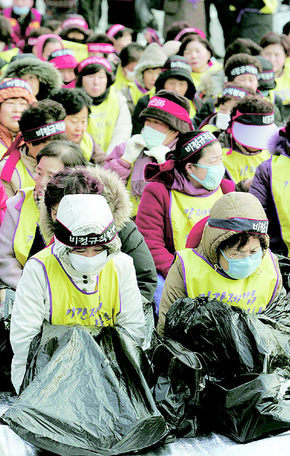 |
|
Non-regular workers hold a rally in Seoul on December 5 to demand that non-regular workers' rights be protected.
|
Critics say legislation will result in further job instability
Three controversial laws regarding part-time and contract workers passed the National Assembly on November 30, but critics doubt whether the laws can protect these so-called non-regular workers' rights, as claimed by the government and the ruling party. Under the new laws, which will take effect in July next year, local employers are obliged to grant regular-worker status to all non-regular workers that they have employed for more than two years. But labor, management, and scholars expressed the view that "due to the new laws, there will be mass layoffs'' of non-regular workers. Without any backup measures, the laws designed to protect non-regular workers will instead intensify employment insecurity every two-year employment period, they said. Officials at the Korea Employers Federation (KEF), the Korea Chamber of Commerce and Industry (KCCI), and the Korea Federation of Small and Medium Business (KBIZ) all agreed that as the new system will pose a great burden to the companies, making large-scale dismissal inevitable.Lee Dong-eung, an official of the KEF, said, "Without special measures to ease the burden felt by companies, it will be difficult to grant regular worker status to non-regular workers. The mass lay-off is inevitable two years after the laws go into effect," he added. Park Mi-hwa, an official at KBIZ, said that "small and medium businesses are suffering from an unstable economic cycle, so I think it is impossible for non-regular workers to be given regular worker status only because they have worked at a company for two years." The majority of non-regular workers are employed at small and medium-sized businesses. According to the Labor Ministry, 84.5 percent, or 4.68 million of the estimated 5.48 million part-time and contract workers, are employed at companies with fewer than 100 staff members. Labor experts also expressed such concerns. Eun Soo-mi, a researcher at the Korea Labor Institute, noted, "There is no guidance system to convert contingent workers into regular workers. The new laws will inevitably result in mass layoffs.'' Kim Seung-hi, an official at the Working Voice, said that "if firms hire non-regular workers for just 364 days, and lay them off, and then re-hire them for another 364-day period, and so on, firms can evade violating the law." An alternative was proposed that would make it not the length of time that an individual had worked at a company, but rather a specific job description. This means that a position cannot be occupied by irregular workers for more than two years without the firm turning it into a regular position. The hope is that this addendum would add increased flexibility for companies and prevent the feared across-the-board layoffs after two years of employing someone. In contrast to the criticism, the Ministry of Labor and the ruling Uri Party remain optimistic about the new laws. They said, "Under the article banning discrimination, if wages of non-regular workers go up, the benefits to companies of hiring those non-regular workers will disappear. Then the employers will choose to convert such workers to regular workers.'' Please direct questions or comments to [englishhani@hani.co.kr]






